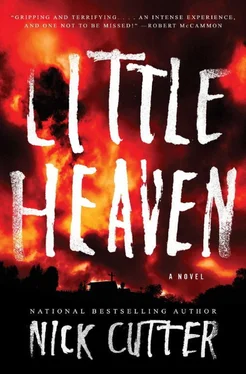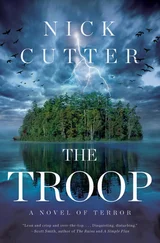She peered through the maze of dead limbs, leaning forward until her nose nearly touched the fence… She recoiled.
The light moved differently the deeper into the woods she looked. It shifted and churned and took on a life of its own. Ellen got the unpleasant sense that it was staring right back at her. Which was utter foolishness. It was the middle of the afternoon, and neither light nor shadow had its own animus.
Her eyes lifted over the wasted trees to the rock formation looming to the west. It was massive and boxy, less a mountain than some kind of obelisk—a boxy tusk—pushed up from the earth. It rested against the horizon in solitary abandonment.
She continued past a string of bunkhouses where the Little Heavenites must spend their nights. The windows were transparent sheet plastic stapled to the frames—it would be hard to transport glass up here, Ellen guessed. But all the windows on the Reverend’s dwelling were made of glass, weren’t they? What had these people left to come here? Surely homes more impressive than these. But that was part of faith, wasn’t it? Suffering. Ellen had never cottoned to that thinking. Life was too damn tough on its own terms to go depriving yourself further.
She hoped she’d see her nephew, Nate, gazing through one of the plastic windows or chasing a ball across the square. Even seeing mailman Reggie would be fine, as it would mean Nate was nearby. They couldn’t have left, could they? Well, better if so. Better Reggie was back delivering letters and Nate back in school.
The living quarters gave way to a warehouse strung with wooden doors. All were closed except one. She peered through it into an area containing an array of familiar equipment: an open-faced furnace, metal blowpipes, and buckets of decorative glass beads. A glassblowing setup. Ellen had taken a course on it years ago—she was going through a bohemian phase while dating a modern primitive who played the pan flute in the Tenderloin district. Folly of youth.
She passed around the edge of the warehouse and found herself facing the playground.
A gaggle of children was immersed in some distraction beside the teeter-totter. Curious, Ellen wandered over. It was good to finally see some life at Little Heaven.
Three girls, one boy. The boy was not Nate—he was too old, and a redhead. Nate had brown hair, or was it black? Their laughter frothed over Ellen. They were hunched in a circle, working intently at something.
She drew closer. They all wore the same shoes—Buster Browns. The soles were cracked and scuffed. Maybe they were brother and sisters, or maybe all the children at Little Heaven had to wear the same clothes the way the Amish do? She could hear their animated whispers.
“Stir them around,” one girl said. “That will make them bite.”
The boy did something with a stick. A stirring motion followed by a series of quick jabs.
“Yes, oh yes,” a girl with plaited blond hair said, “that’s working. Do it some more.”
Ellen was five feet away. None of them had noticed her. A powerful dread built inside of her. Why was she so worried? It was just some kids playing.
“Hello,” she said.
They turned, all at once. Ellen’s breath hitched. She took a step back.
There’s something the matter with these kids.
That was her first, purely instinctive thought. They weren’t sick in an obvious way. No boils on their arms or open sores on their faces. They were not palsied, their mouths hanging open and leaking drool. And yet there was something—absolutely, fundamentally —wrong with them.
“What are you doing?” she asked.
“Who are you?” asked one of the girls. She wore a yellow dress that had faded to the color of old parchment. Her voice made it sound less of a question than an accusation. “You scared us.”
Their faces were caved in the same way Charlie’s and Otis’s had been, but worse—or perhaps it only seemed worse because they were young? Their flesh appeared to be slumping into their skulls, the way the earth sags before a sinkhole opens up in it. There were fine wrinkles around their mouths and eyes and even the knobs of their ears. They looked as if they had stepped from a terrible compression chamber that had added years to them.
Ellen stared past them to their industry—she couldn’t look at their too-old faces for another second. She saw a small ring of sticks jabbed into the dirt, with twine banded round to keep them in place.
Things were moving inside the ring of sticks. Quite a lot of things—
Something was thrashing around in there, too. Thrashing and squealing.
“I’m…” Ellen said slowly. “We were lost in the woods. Some of your people found us and brought us here.”
The boy smiled at her. It was not a pretty smile. His skin seemed too hard and white, more bone than flesh. “Little Heaven welcomes you,” he said.
Ellen stepped closer. The children moved aside so she could see. They exhibited no shame—in fact, they seemed eager to show her.
A hairless shrew was staked inside the ring. A loop of wire was knotted around its tail, the trailing end wound round a stick sunk into the dirt in the center of the ring. The shrew was covered in red ants. They surged over its body in a thick carpet, four deep in spots. The shrew shrieked as the ants mercilessly stung it.
“There are no animals left,” the boy said. “But if we’re good, he gives us one.”
He who? Ellen wondered.
“Why are you doing this?”
One of the girls said: “For everything there is a season.”
The bone-faced boy waved the stick he’d used to stir the ants like a conductor urging his orchestra toward a crescendo. He hummed a tuneless ditty. “Hmmm-hm-hmm-mmmm, ha-hum-hmmmm…”
The girls giggled. The boy’s fingertips were bloody from shrew bites and swollen from ant stings. He seemed to neither notice nor care.
Ellen said, “Where are your parents?”
“You talk too much,” said the girl in the faded dress. They all giggled some more.
The shrew’s struggles were slackening. Its black eyes stared out from the massing ants, dull and expressionless. A terrible soft hiss rose up, the sound of the ants’ bustling bodies. Ellen wanted to kick the ring apart. But she was worried about what these children might do to her if she stopped their barbarous game.
She knelt and pushed the children aside. She did so roughly, mildly revolted by the soapy feel of their skin. They parted willingly, brushing past her, leaving the playground. Ellen thought they had merely grown bored, or were going to tattle on her for pushing them, but they were moving toward the chapel, whose bell had now begun to toll.
The girl with plaited golden hair spun nimbly on her heel.
“You’re going to love it here,” she said. “You won’t ever want to leave.”
Ellen pulled the ring of sticks apart. She saw it had been built around the ants’ hill—they were only defending their home.
The shrew wasn’t moving anymore.
“A SHREW?”
Minerva forked chunky, tasteless stew into her mouth. They were sitting in the mess: Minerva, Ellen, Micah. Ebenezer was back in the bunkhouse, waiting for the doctor to look at his ankle.
Ellen had found them here shortly after her encounter with the children. She could only manage a bite of stew. Her appetite was gone. She had buried the poor shrew in a patch of dirt along the fence. Its body was swollen to double its size from the ant venom, so much that its skin had split open.
“They pinned it on top of an anthill,” she said. “They tortured it.”
Minerva picked mystery meat from her teeth. “Little shits. Well. Who am I to criticize? I had a magnifying glass as a kid. You think I used it to look at stamps? I must’ve fried a small city’s worth of ants.”
Читать дальше












